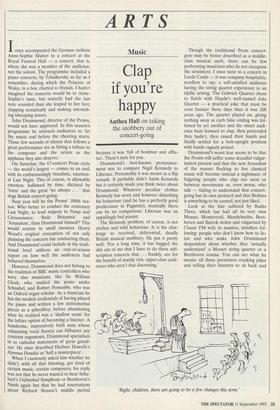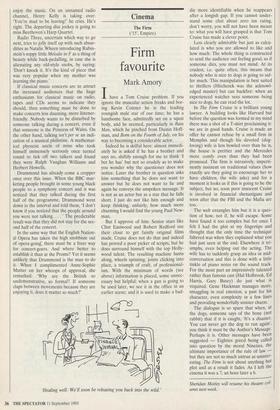ARTS
Music
Clap if you're happy
Anthea Hall on taking the snobbery out of concert-going Ionce accompanied the German violinist Anne-Sophie Mutter to a concert at the Royal Festival Hall — a concert, that is, where she was a member of the audience, not the soloist. The programme included a piano concerto, by Tchaikovsky as far as I remember, during which the Princess of Wales, in a box, chatted to friends. I hadn't imagined the concerto would be to Anne- Sophie's taste, but scarcely had the last note sounded than she leaped to her feet, clapping ecstatically and making astonish- ing whooping noises.
John Drummond, director of the Proms, would not have approved. In this season's programme he instructs audiences to 'let the music end before the cheering starts. Those few seconds of silence that follows a great performance are as fitting a tribute to the composer and the artists as the applause they also deserve.'
On Saturday, the 67-concert Prom cycle — the world's largest — comes to an end, with its embarrassingly ritualistic, emotion- al Last Night. This of course, is allowable emotion: hallowed by time, dictated by `form' and the great 'we always . . . ' that dogs British concert-going.
Next year will be the Proms' 100th sea- son. Who better to conduct the centenary Last Night, to lend majesty to Pomp and Circumstance, 'Rule Britannia' and `Jerusalem', than Drummond himself? This would restore in small measure Henry Wood's original conception of not only planning the concerts but conducting them. And Drummond could include in the tradi- tional brief address an end-of-season report on how well the audiences had behaved themselves.
However, Drummond does not belong to the tradition of BBC music controllers who were also musicians, like Sir William Glock, who studied the piano under Schnabel, and Robert Ponsonby, who was an Oxford organ scholar. As a musician he has the modest credentials of having played the piano and written a few instrumental pieces as a schoolboy, before abandoning what he realised was a 'shallow seam' for the loftier option of becoming a listener. A handsome, impressively built man whose exhausting vocal fluency can filibuster any contrary arguments, Drummond specialises in ex cathedra statements of great grand- eur. He once described Herbert Howells's Hymnus Paradisi as 'half a masterpiece'.
When I cautiously asked him whether he didn't, with all that listening, get tired of certain music, certain composers, his reply was not that he never wanted to hear Schu- bert's Unfinished Symphony or Beethoven's Ninth again but that he had reservations about Richard Strauss's middle period because it was 'full of bombast and affla- tus'. There's style for you.
Drummond's best-known pronounce- ment was to compare Nigel Kennedy to Liberace. Presumably it was meant as a flip remark. It probably didn't harm Kennedy but it certainly made you think twice about Drummond. Whatever peculiar clothes Kennedy has worn and however disturbing his behaviour (and he has a perfectly good predecessor in Paganini), musically there can be no comparison: Liberace was an appallingly bad pianist. The Kennedy problem, of course, is not clothes and wild behaviour. It is his chal- lenge to received, deferential, deadly British musical snobbery. He put it pretty well: 'For a long time, it has bugged the shit out of me that I have to do these sub- scription concerts that . . . frankly, are for the benefit of mainly rich, upper-class audi- ences who aren't that discerning.' Though the traditional Prom concert- goer may be better described as a middle- class musical snob, there can be few performing musicians who do not recognise the sentiment. I once went to a concert in Leeds Castle — it was company hospitality, needless to say: a self-satisfied audience having the string quartet experience in an idyllic setting. The Gabrieli Quartet chose to finish with Haydn's well-named Joke Quartet — a practical joke that must be even funnier these days than it was 200 years ago. The quartet played on, giving nothing away as each false ending was fol- lowed by yet another and the smart audi- ence bent forward to clap, then pretended they hadn't, then raised their hands and finally settled for a bolt-upright position with hands vaguely poised.
Drummond's worst fear seems to be that the Proms will suffer some dreadful vulgar- isation process and that the new Jerusalem of the masses flocking to live classical music will become instead a nightmare of fidgeting people who clap too soon or between movements or, even worse, who talk — failing to understand that concert- going has its own protocol and that Brahms is something to be earned, not just liked.
Look at the fate suffered by Radio Three, which has had all its very own Mozart, Monteverdi, Mendelssohn, Beet- hoven and Bartok stolen and vulgarised by Classic FM with its massive, mindless fol- lowing: people who don't know how to lis- ten and who make John Drummond despondent about whether they 'actually understand' a Mozart string quartet or a Beethoven sonata. You can see what he means: all those presenters cracking jokes and telling their listeners to sit back and `Right, children, there are going to be a few changes this term.' enjoy the music. On an unnamed radio channel, Henry Kelly is taking over: `You're mad to be leaving!' he cries. He's right. The departing disc jockey is going to miss Beethoven's Harp Quartet.
Radio Three, uncertain which way to go next, tries to jolly itself up with such absur- dities as Natalie Wheen introducing Rubin- stein's soppy little Melodie in F as a thing of beauty while back-pedalling, in case she is alienating any old-style snobs, by saying: `Don't knock it. It's the kind of piece that was very popular when my mother was learning the piano.'
If classical music concerts are to attract the increased audiences that the huge enthusiasm for classical music on radio, tapes and CDs seems to indicate they should, then something must be done to make concerts less daunting, more listener- friendly. Nobody wants to be disturbed by someone talking during a concert, even if that someone is the Princess of Wales. On the other hand, talking isn't per se an indi- cation of a musical philistine. A mathemat- ical physicist uncle of mine who took himself immensely seriously once turned round to tick off two talkers and found they were Ralph Vaughan Williams and Herbert Howells.
Drummond has already come a cropper once over this issue. When the BBC mar- keting people brought in some young black people to a symphony concert and it was noticed that they talked during the first half of the programme, Drummond went down in the interval and told them, 'I don't know if you noticed that the people around you were not talking. . . ' The predictable result was that they did not stay for the sec- ond half of the concert.
In the same way that the English Nation- al Opera has taken the high snobbism out of opera-going, there must be a freer way for concert-goers. And where better to establish it than at the Proms? Yet it seems unlikely that Drummond is the man to do it. When I complimented Anne-Sophie Mutter on her whoops of approval, she remarked: 'Why are the British so undemonstrative, so formal? If someone claps between movements because they are enjoying it, does it matter so much?'



















































 Previous page
Previous page